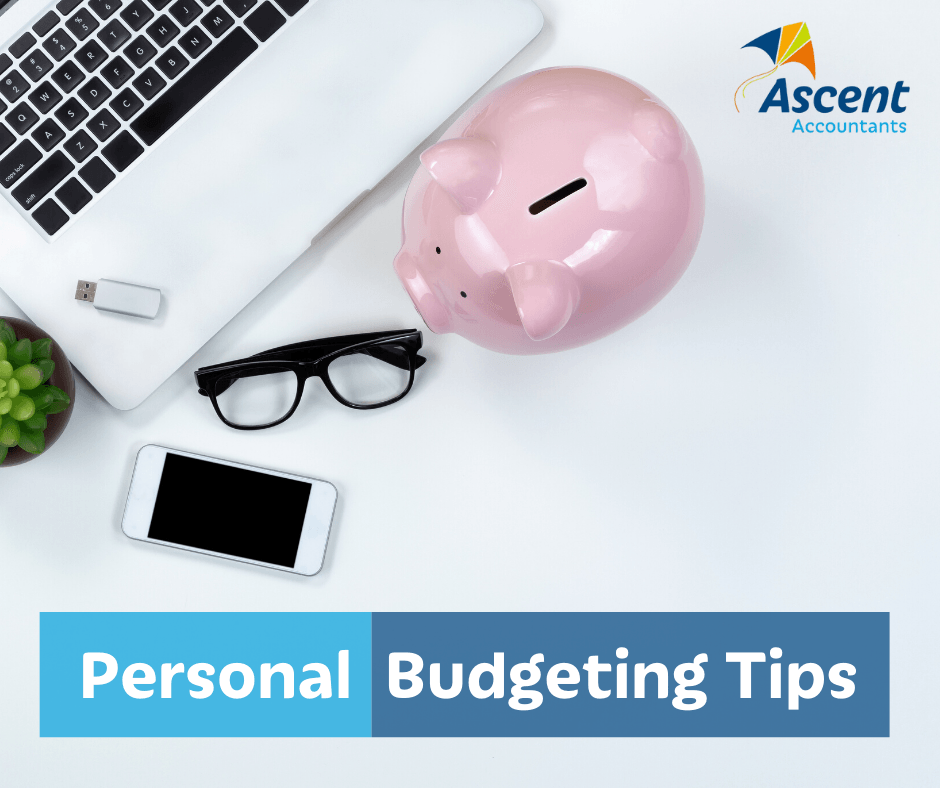Personal budgeting tips for the new financial year

1. Start today
It can be tempting to put your personal budgeting off. It can be a dry and boring task that is easily put on the shelf for later. However, the sooner you get started, the better!
Whether it’s business or personal budgeting, the new financial year is the perfect time to sit down and really study your books and go over your costs to see where your money is going, and if there are any obvious flaws or areas to improve.
Keep in mind that this is not something you have to do alone. Accountants and bookkeepers can be absolute life savers and can help make this task easier as well as more effective.
2. Take stock
Take a big step back and look over all your personal spending last year.
Review your savings levels compared to this time last year, as well as your mortgage. Has it decreased since this time last year?
Overall, do you think your personal finance numbers tell you anything important at a first glance? Maybe you simply lack discipline, or it’s a bit deeper and you may need some help on how to really get on top of things to master your personal budget. This is always an important place to start.
3. Set goals
Going into personal budgeting blind with no real aim is near impossible. So it always helps to sit back and think about your short term and long term personal financial goals.
Don’t forget to be realistic when doing this. Don’t set yourself up for failure. Really look at your incoming and outgoing finances and makes sure that your personal finance goals align with your income and lifestyle.
4. Look at your spending
This may seem obvious, but your personal spending can also be a hard number to face. Sitting back and reviewing your personal expenditure over the last year can help give you a clear idea or where you might be going wrong (or right!).
Looking at these numbers will pretty quickly tell you if you need to be tightening your personal spending habits.
Personal budgets can feel a bit constricting, but unless you know how much money you have and how you’re spending it, it’s near impossible to improve.
You also need to be prepared to make cuts. Maybe your large coffee every morning and regular meals out need to be a bit less regular.
5. Now look at your savings
Now that you have used your personal budget to review your outgoings, it can be a good chance to see where you can boost your savings.
A great way to make positive budgeting progress it to set up a separate savings account with an automatic transfer set up. This is such an easy way to force yourself into good budgeting habits as the money is set aside with no effort, and because it’s separate, it’s a lot easier to not be tempted to spend it.
Try and be as realistic as you can with how much you transfer. Even if it’s only $50 a week. That quickly adds up, especially if you would normally spend that money otherwise. You don’t want to start off by transferring too much because then you will just get in the habit of transferring it back when needed which defeats the aim of your personal budget.
6. Pay off your debts
Debts hang over us like a heavy rain cloud and can affect you in so many ways. Whether that be because it can affect your borrowing capacity if you want to take out a loan, or it simply emotionally draining. Nobody likes being in debt and for many, getting out of debt is the number one goal of their personal budget!
So where you can, focus your personal budget on putting money aside to pay off your debts. You can also think forward, and if you’re wanting to take out a mortgage, start putting aside extra money for the deposit in order to lower the interest and therefore lower your debt over the lifetime of the loan.
7. Don’t forget to put some money away for a rainy day
If the last few months have taught us anything, it’s that life is very unpredictable. So part of your personal finance plan should be to have some money set aside should there be an emergency, or unforeseen circumstances arise. You never want to be in a position to not be able to support yourself and your personal budget can ensure this is never the case.
As always, never hesitate in turning to professional help when needed. Personal finance can be a tricky and overwhelming thing to sort and having someone on your team who knows how to plan and manage a personal budget can make a world of difference.
Need help with your accounting?








